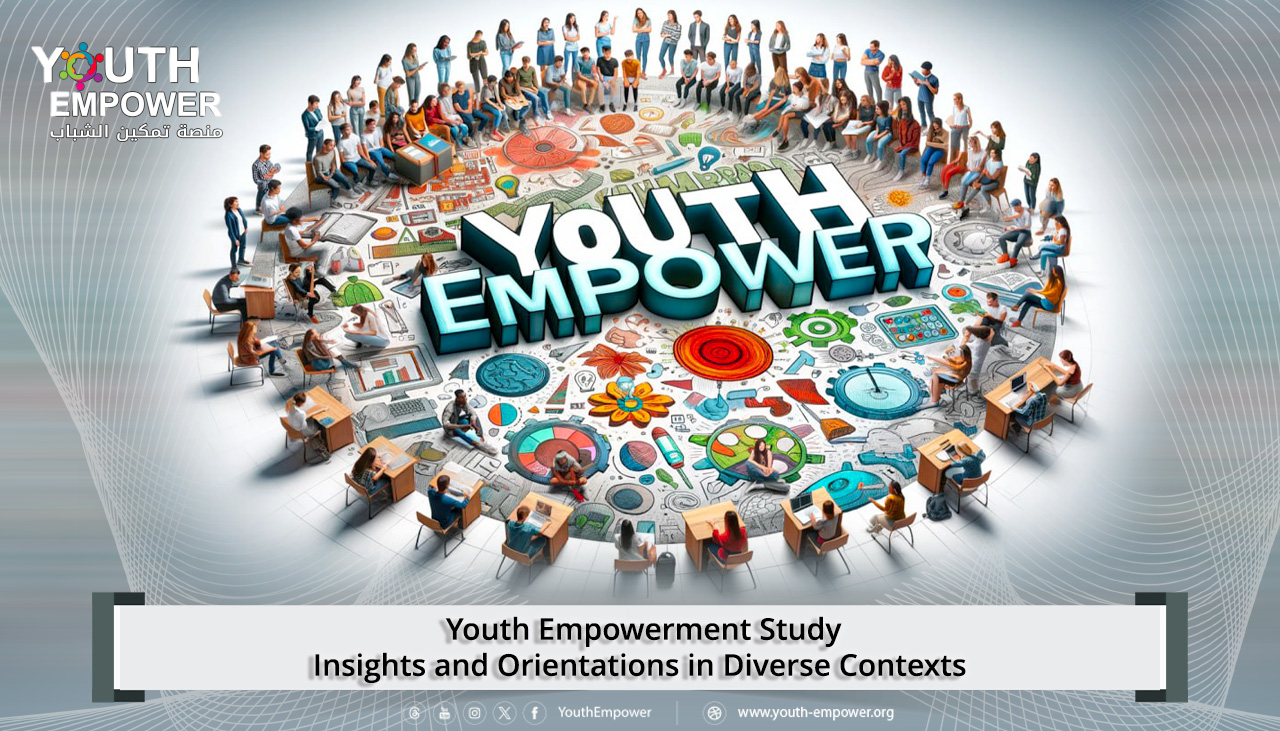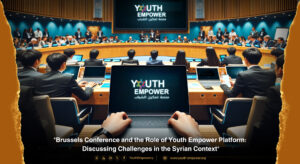In our present time, the issue of youth and their empowerment is one of the main priorities in contemporary societies.
The youth demographic plays a crucial role in shaping the future of nations, whether through their active participation in the political process, their contributions to innovation and economic growth, or through their cultural and social influence.
The importance of this study lies in exploring and deeply understanding how to define youth
and analyzing the diverse factors that form their identity and experiences in various societies around the world.
This study aims to provide a comprehensive and multi-dimensional definition of “youth,” relying on a methodology that combines quantitative and qualitative analysis. Data collected through surveys and interviews with a diverse group of people from various ages, nationalities
and cultural backgrounds will enable a deep and multifaceted view of the concept of youth and the factors influencing this age group.
Understanding the definition of youth is not limited to identifying a certain age group, but also includes understanding the cultural, social, and economic contexts that shape their experience and identity.
Through this study, we seek to uncover ways to empower and support youth in various societies
and to identify the opportunities and challenges they face in the modern era.
The study will provide a detailed analysis of the collected responses, aiming to present a deeper and more comprehensive understanding of the concept of youth and its impact on society as a whole.
Through this research, we hope to offer valuable contributions. Consequently, these can assist in formulating policies and programs that recognize the vital role youth play in developing their societies and the world.
Section One: Defining Youth
The definition of youth varies in interpretation across different cultures and societies. According to the study’s findings, 38% of the participants believe that the definition of youth changes depending on the cultural and social context. This indicates that the concept of youth is not fixed but variable and flexible, influenced by various factors such as cultural values and social circumstances.
On the other hand, 31% of the participants consider the definition of youth to be a period of physical and mental growth and development
reflecting the common view of youth as an important transitional stage in life.
Additionally, 27% of the participants view the definition of youth as being linked to a specific age group, suggesting a more defined perspective of youth as a particular age stage.
Finally, there are 4% of participants who believe that the definition of youth does not fall under any of the aforementioned definitions
indicating a wide range of opinions on this subject.
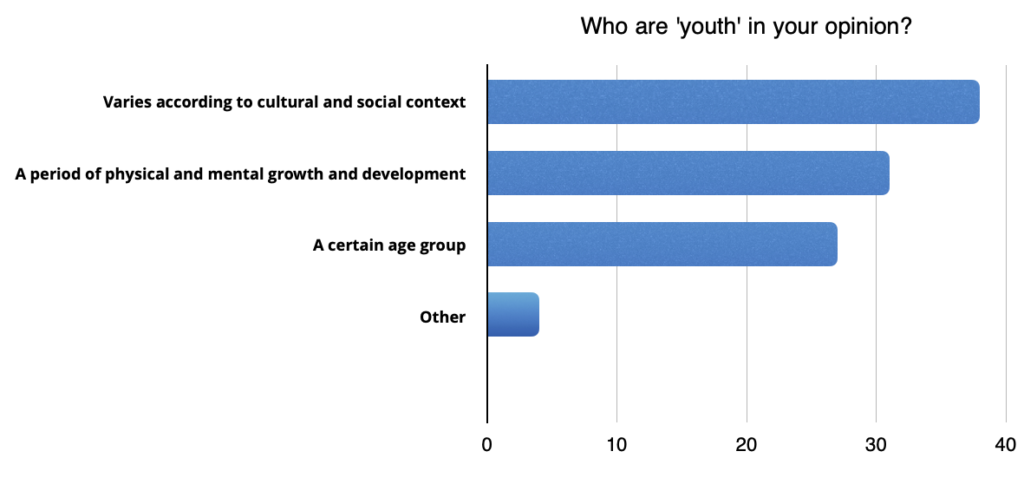
Section Two: The Age Group Representing Youth
The determination of the youth age group also varies from one society to another and from one country to another. The study shows that 63% of the participants consider the youth phase to extend from the age of 18 to 39 years.
This reflects the common view in many societies that consider youth as a period extending for two decades
starting from adulthood and continuing until just before middle age.
Conversely, 21% of the participants believe that the youth phase ranges from 18 to 29 years, indicating a narrower definition of youth. Meanwhile, 6% consider this phase to start at 18 and end at 24 years, reflecting a focus on the early stage of youth. Additionally, 10% of the participants believe that the youth phase cannot be defined by a specific age, indicating a flexible and unrestricted understanding of this age group.
“These results highlight the great diversity in perceptions of the youth phase and its definitions, reflecting the complexity and variation in understanding this important stage of life in different cultures and societies around the world.“
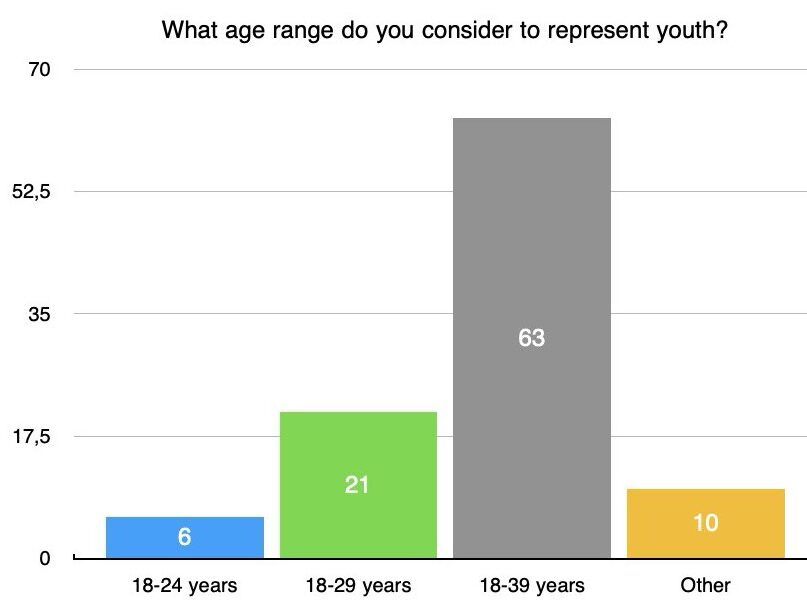
Section Three: Youth Awareness of Their Rights
Awareness of youth rights is a pivotal aspect in their empowerment and ensuring their effective participation in society. According to the study, 80% of the participants reported being aware of youth rights. This high percentage reflects the growing awareness of the importance of youth rights in various cultural and social contexts. However, there are still 20% of participants who feel unaware of youth rights
indicating a knowledge gap that may affect their ability to claim their rights and participate effectively in society.
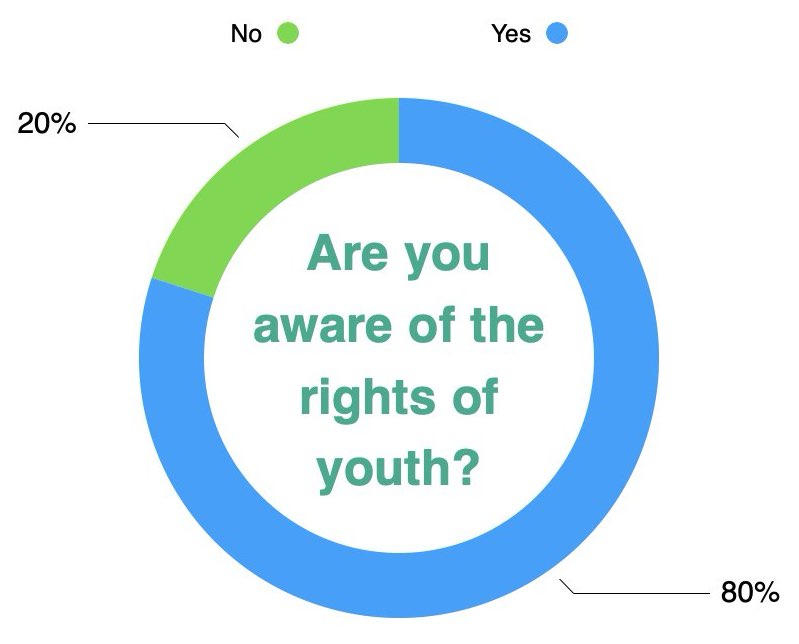
Youth Study – Section Four: Youth Opportunities in Participation and Making Change
On the other hand, the study indicates that 77% of the participants believe that youth have the ability to participate in making changes in their societies.
This result underscores the important role that youth can play in driving progress and innovation across various fields. This percentage is a positive indication of confidence in the capabilities of youth and belief in the importance of their contributions to society.
On the contrary, 23% of the participants believe that youth lack the ability to make a change.
This highlights the need for increased support and empowerment for this age group.
Consequently, enhancing their support ensures their ability to participate effectively and bring about positive change in their societies.
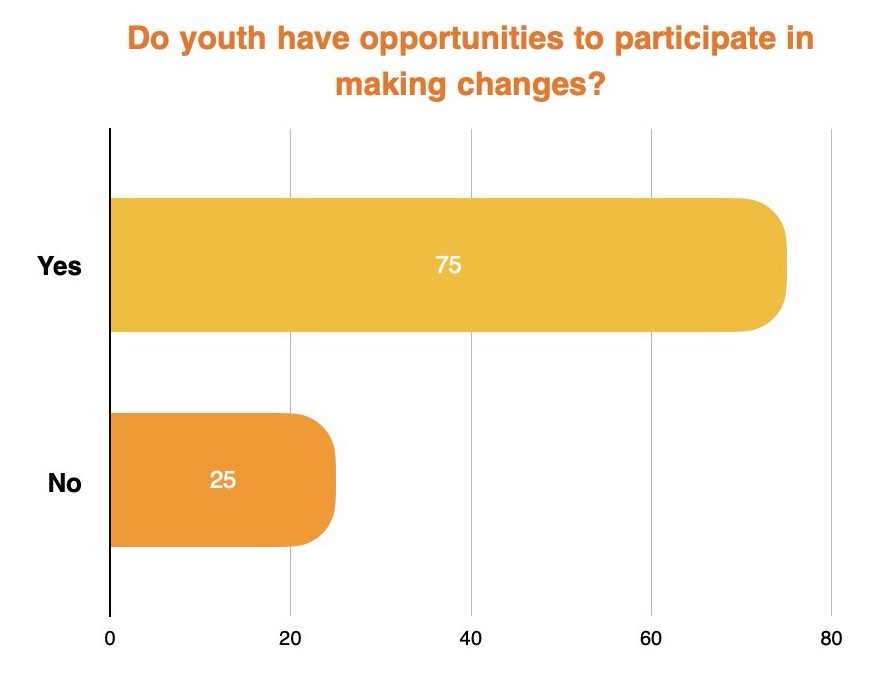
“From these third and fourth sections, it is evident that there is a high appreciation for the role and potential of youth in social participation and change. However, there remains a challenge in enhancing their awareness of their rights and further empowering them to be able to exercise these rights and effectively participate in their societies.“
Section Five: Youth Performance of Their Social Duties
Social duties are considered an essential part of the responsibilities of youth towards their societies. According to the study, 48% of the participants believe that youth are fulfilling their social duties. This figure reflects a considerable number of youth who are actively engaged in their communities, whether through volunteering activities, participation in social events, or contributions in various public areas.
On the other hand, 52% believe that youth are not adequately performing their social duties
indicating the existence of challenges that may prevent their effective participation in society.
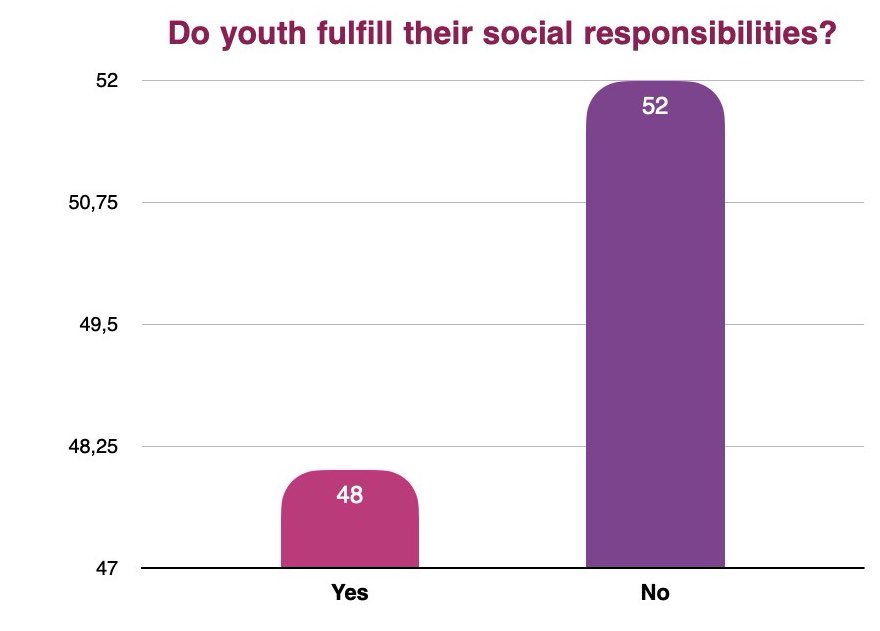
Section Six: Youth Access to Their Rights
The issue of youth fully obtaining their rights is an important indicator of the health and democracy of societies. The study reveals that 90% of the participants believe that youth do not fully receive their rights. This indicates a significant gap between the rights that are stipulated and the practical reality experienced by youth. This figure points to the necessity of re-evaluating the policies and laws affecting youth and assessing their effectiveness in enabling this age group to obtain their rights.
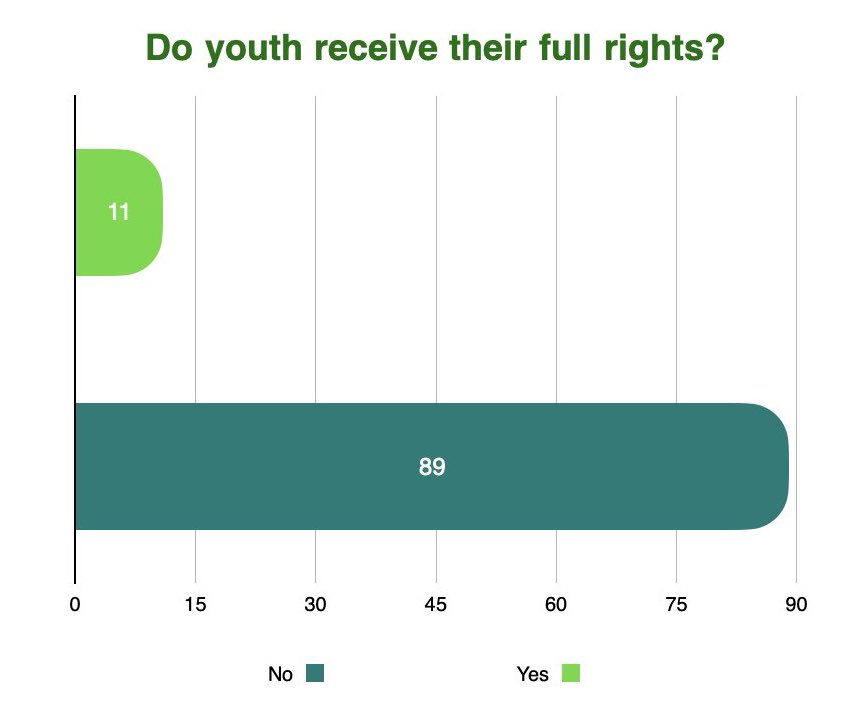
Youth Study – Section Seven: Legal Support for Youth
Laws play a crucial role in determining the extent to which youth are empowered and able to participate effectively in society.
According to the study, 73% of participants believe that the laws in their societies do not sufficiently support youth. This reflects the presence of legal and political challenges that may hinder youth participation and empowerment. Conversely, 27% of the participants believe that the laws support youth.
These results highlight the importance of developing policies and legislation that support youth and enhance their status and role in society.
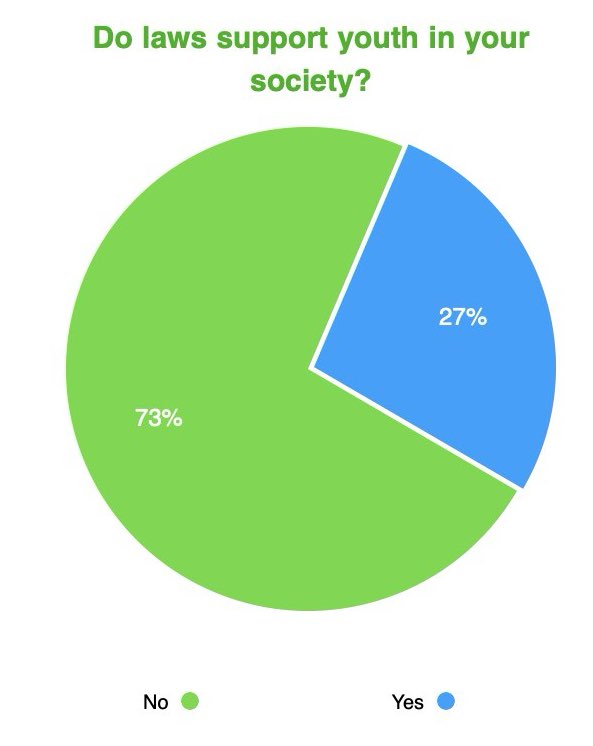
“Through these sections, it becomes evident that there are multiple challenges facing youth in the areas of social responsibilities, acquiring rights, and legal support. These results underscore the urgent need for developing strategies and policies that prioritize empowering youth and ensuring their rights and active participation in society, with Security Council Resolution 2250 serving as an example.”
Section Eight: The Impact of Social Media on Youth
Social media plays a pivotal role in the lives of contemporary youth. According to the study, 43% of the participants view the impact of these media as acceptable, while 31% consider their impact to be negative. On the other hand, 26% of the participants believe that the impact of social media is positive. These diverse opinions reflect the complex influence of social media on youth, providing opportunities for communication, self-expression
and learning, yet at the same time, they can be sources of psychological stress and negative influence.
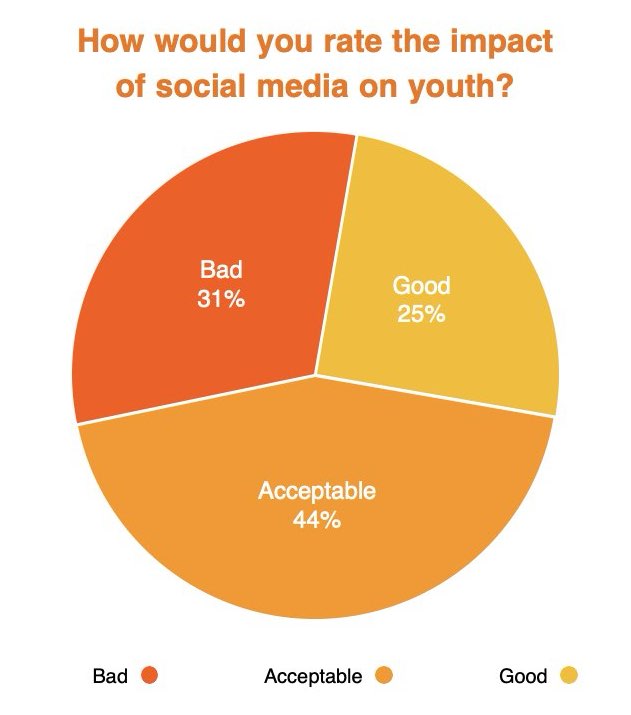
Section Nine: Youth Participation in Youth Projects
Participation in youth projects is considered an important aspect of youth development and empowerment. According to the study, 48% of the participants stated that they have participated in youth projects, while 42% reported that they have not participated in any youth project. This percentage indicates that there are opportunities available for youth to engage in projects that enhance their skills and provide them with opportunities to influence their communities.
However, it also highlights the need to provide more such opportunities to ensure the participation of as many youths as possible.
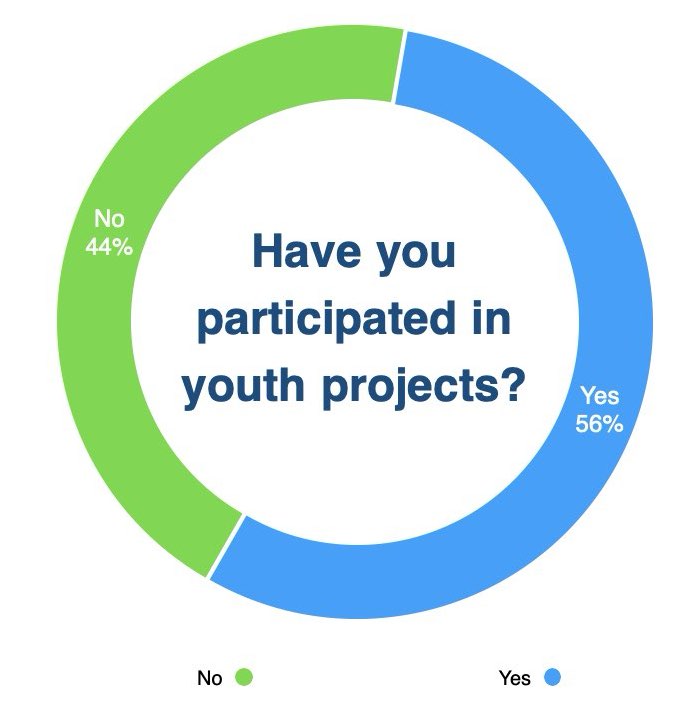
Youth Study – Section Ten: Benefits of Volunteering for Youth
Volunteering is seen as an important means of developing the skills of youth and enhancing their social responsibility. The study shows that 62% of the participants believe that volunteering is very beneficial for youth, while 38% think it is somewhat beneficial.
These results reflect the positive role that volunteering can play in enhancing the personal and professional growth of youth
in addition to fostering a sense of social responsibility and contributing to community service.
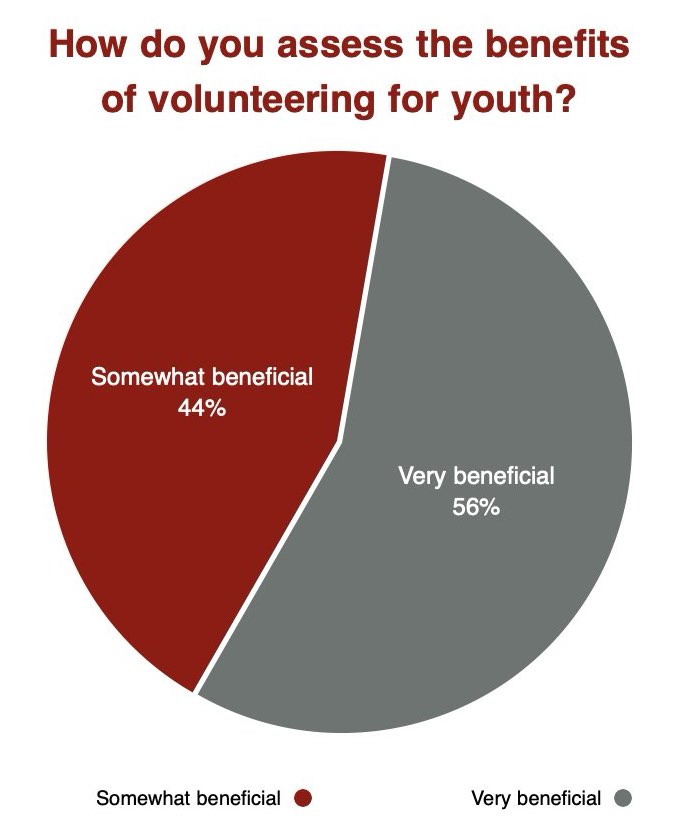
“Through these sections, it is evident that social media, participation in youth projects, and volunteering represent influential elements in the experience and development of youth. The study underscores the importance of these elements in enhancing the capabilities of youth and empowering them to be active and influential members of their societies.“
Section Eleven: The Need for Programs to Improve the Conditions of Youth
Recognizing the need for programs that enhance and improve the conditions of youth is pivotal for the development of societies. According to the study, 97% of the participants affirm the necessity of having dedicated programs to improve the conditions of youth. This high percentage highlights a significant consensus among the participants about the urgent need to support youth in various fields. It reflects the growing awareness of the importance of investing in youth as a fundamental resource for sustainable development and economic and social growth.
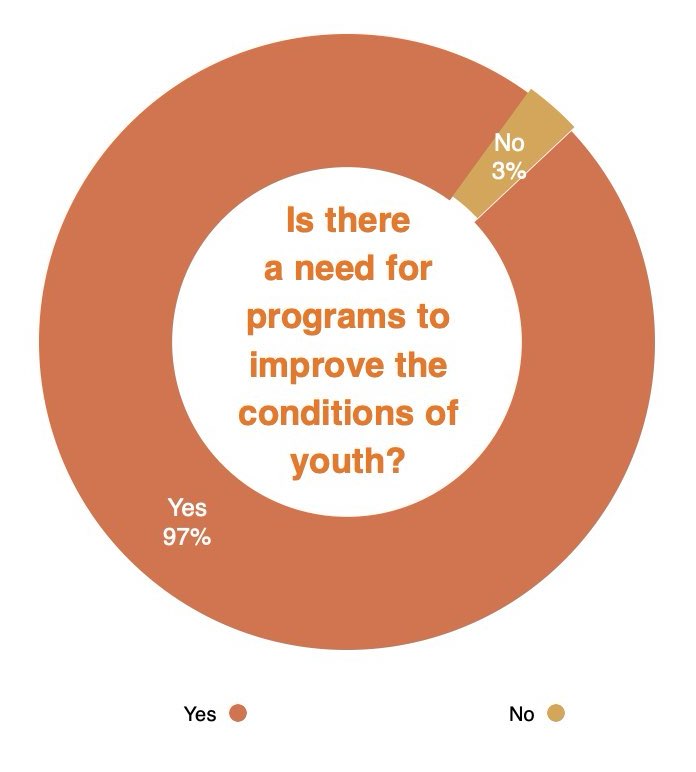
Section Twelve: Youth Study – Recommendations for Youth Support Programs and Measures
In the context of efforts aimed at improving the conditions of youth, several important suggestions have been derived from the study, aiming to enhance the role of youth and empower them in their societies.
The most prominent of these suggestions and recommendations include:
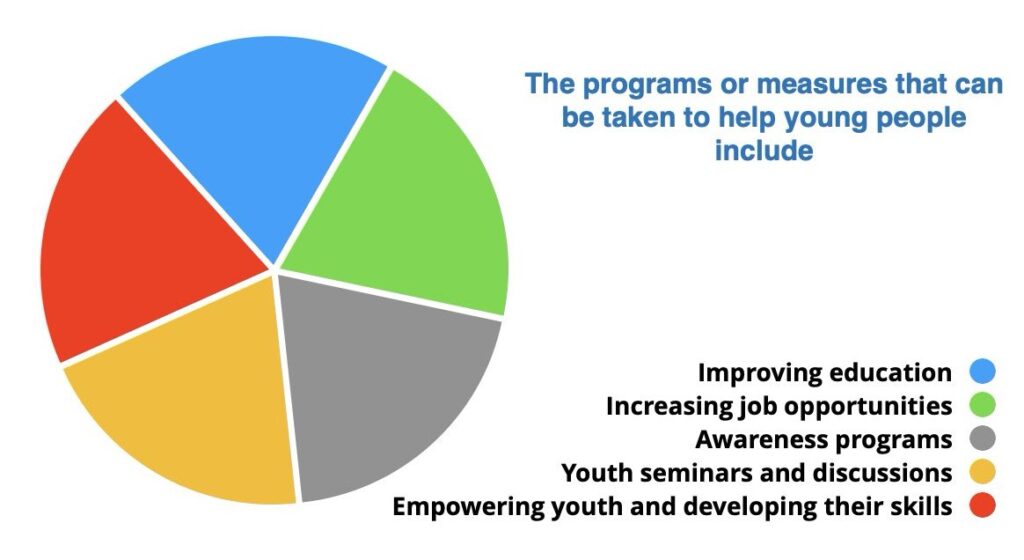
Improving Education:
The study points to the need to develop educational curricula to make them more aligned with the requirements of the modern job market. This includes providing opportunities for continuous education and practical training, as well as a special focus on improving the educational situation in Syria and supporting it to create a new generation capable of contributing to building a prosperous future. This development necessitates a focus on comprehensive education.
Moreover, it includes enhancing 21st-century skills such as critical thinking, creativity, and adaptation to modern technology.
Youth Study – Increasing Employment Opportunities:
The study emphasizes the importance of providing new and diverse job opportunities for youth. This includes creating an environment conducive to entrepreneurship and freelance work, as well as developing programs for vocational training and practical skills.
It is essential to focus on enhancing partnerships between the private sector and educational institutions.
This ensures the provision of job opportunities that match the skills and interests of youth.
Awareness Programs:
The study stresses the necessity of organizing awareness programs to educate youth about their rights and duties. This includes providing information on effective ways of participating in society and raising awareness about issues of social, civil, and political justice.
Organizing awareness programs that focus on enhancing the mental and physical health of youth is crucial.
These programs should encourage them to make informed and responsible decisions in their daily lives.
Youth Seminars and Dialogues:
The study emphasizes the importance of regularly organizing these activities to enable youth to express their opinions and exchange ideas. This includes providing opportunities for youth to discuss issues that affect them and work on finding practical solutions. These seminars and dialogues should be designed to encourage youth to be creative and innovative and to enable them to build important networks with their peers and experts in various fields. These events should cover a variety of topics addressing both global and local issues. Additionally, they offer platforms for discussion about policies and programs that impact youth.
Empowering Youth and Developing Their Skills:
The study focuses on the importance of providing programs that develop the personal and professional skills of youth. This includes facilitating access to higher education and universities in refugee-hosting countries and virtual universities, as well as enhancing opportunities for scholarships and distance learning programs.
It is also essential to provide programs that focus on developing leadership, management, and effective communication skills
in addition to enhancing technological and digital skills to keep up with changes in the job market.
“These suggestions highlight the urgent need to adopt comprehensive and multi-dimensional strategies targeting the support and empowerment of youth. These measures are a fundamental step towards achieving more inclusive and just societies, where youth are valued and supported as leaders of the future.“
Youth Study: Conclusion and Findings, Suggestions, and Recommendations
In conclusion of this study, the first of its kind conducted by the Youth Empowerment Platform, several significant findings have been drawn that highlight the diverse dynamics of youth experience across different cultural and social contexts.
Through analyzing the data and opinions gathered from the participants, the study has reached a deeper understanding of the concept of youth, their rights, and needs. Consequently, it has also illuminated the challenges they face.
The findings clearly indicate that the definition and experience of youth vary greatly across cultures and societies.
The study also underscores the urgent need for educational and awareness programs targeted at youth
focusing on improving employment opportunities and empowering youth through the development of their personal and professional skills.
One of the key outcomes of this study is the widespread consensus on the importance of providing specific programs to improve the conditions of youth.
The study also reveals recognition of the significance of social media in the lives of youth
emphasizing the necessity of using these tools in a balanced and responsible manner.
It can be said that this study has provided valuable insights into the stance and experience of youth in the contemporary world. The derived results serve as a guide for institutions, policymakers, and youth program developers to create effective strategies aimed at empowering youth and fulfilling their aspirations and needs. Ultimately, the study affirms the importance of investing in youth as leaders of tomorrow and as key drivers of positive change in societies around the world.
Follow us on social media:
Facebook | Twitter | Instagram | WhatsApp


